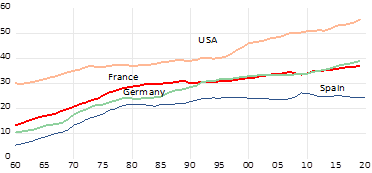World Development Reports published by the Euro-American Association of Economic Development Studies in year 2022
Entry 47 by Maria-Carmen Guisan, Professor of Econometrics, Spain
Provisional version 25-12-2022. Last update 11th September 2024.. The final version is scheduled to be published in EcoDev 128 in year 2025 (see footnote below)
|
IDER |
INTERNATIONAL
DEVELOPMENT REPORTS year 2021 |
|
2021-4 |
Wages, Productivity and Quality of Life in France, Germany, Spain and the United States, 1960-2019 . Related article in Guisan(2021) in RSES (4) |
|
2021-3 |
Industry, Education and Development in 53 African Countries, 1995-2019 (3) |
|
2021-1 |
A Comparison of India, China and OECD Countries for 1950-2020 (2) |
|
2021-1 |
Educarion and Development of 164 Countries for 1995-2019 |
The final versions of IDER reports of year 2021 are scheduled to be published in Guisan(2025 c) EcoDev 127, downloadable at Ideas.Repec.
Related articles in AEID and RSES:
(1) World Development For 1995-2020: Econometric Relationships Of Human Capital, Development, Quality Of Government And Life Satisfaction In 164 Countries, Guisan, M.C Abstract and article in AEID 21-1
(2) Employment by Sector and Development in India for 1950-2020 and International Compa-risons with China and OECD Countries, Guisan, M.C.Abstract and article in AEID 21-1.
(3) Industry, Education, Development and Quality Of Life In 53 African Countries, 1995-2020, Guisan, M.C., Exposito, P. Abstract
(4) Spanish and European Report 2021: Wages, Productivity, Quality of Public Sector and Citizens Satisfaction, Guisan M.C. (Abstract and article in English) (Article in Spanish)
Initial versions of IDER 21-1 to 21-4 (year 2021)
IDER 2021-1: World Development 1995-2019
Evolution in 24 years: Real production per capita increase in 6249 Dollars (at 2017 prices) in a period of 24 years (from 1995 to 2019), what implies an average of 260 Euros per year, but in the 2 groups of poorest countries the increase was very low with only 20 Euros per year in group 1).
1) Education and Development: Usually Education is the variable with the highest impact on economic development and quaality of life. The indicator Tyr10 is "Total years of schooling of adult population (+25 years old) in year 2010. The value varied between a low average of 3.38 years of Schooling in group 1 (lowest level of economic development) to 11,66 in group 9 (highest level of economic development). World average was 8.09.
2) Average Fertility rate: As seen in the econometric model of Guisan, Aguayo and Exposito (2021) (journal AEID Vol. 1-1), there is an important impact of Education in the moderation of average fertility rates. In table 1 we may notice that countries with the lowest levels of Schooling have high average Fertility rates (4.82 children per woman in group 1) while countries with high educational levels have moderate average Fertility rates (1.53 children per women in group 9).
3) Indicators of Quality of Life in a scale 0 (minimum) to 10 (maximum).
Indicator X1=Happiness varies from an average of 4.27 in group 1 to 7.07 in group 9, usually increasing with real income, health care access, working conditions, and other variables related with socio-economic development.
Indicator X2=Government Quality (calculated in the scale 0 to 10 from the World Bank data of Voice of citizens) varies from 3.12 in group 1 to 7.07 in grourp 9, usually increasin with socio-economic development.
Indicators X3 and X4 (X3=degree of conflict, X4=degree of peace). The average value of X3 varies between 6.00 in group 1 to 3.70, with many types of conflicts usually decreasing with socio-economic development. The average value of X4 varies between 4.00 in group 1 to 6.30 in group 9, usually increasing with socio-economic development.
Indicator XM is the mean of the indicators X1, X2 and X4. The average value varies between 3.79 in group 1 to 7.20 in group 9, usually increasing with socio-economic development.
Other contents of the Development Report: The main objetive of this report is to foster international cooperation in order to increase Schooling, Investment, Production per head and Quality of Life in the World, particularly in countries with the lowest levels.
We highlight the following table from the Report published in AEID 2021 by Guisan, M.C., which is free downloadable by clicking on "Abstract":
A telephon version, of the Website sidebar:




